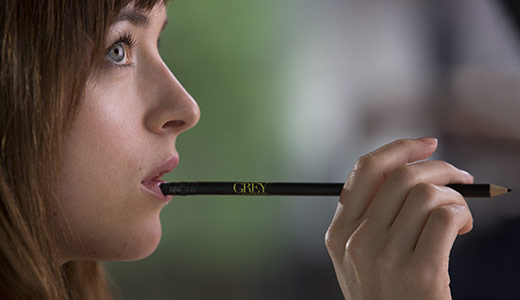A few days ago, Plugged In received an email from a concerned reader, asking us not to review Fifty Shades of Grey. “I’m fairly confident anyone who visits this website will not be interested in seeing the film,” the man’s note said, “and I am troubled at the thought of sending one of your employees to go see it.”
I love this email. I so appreciate that he, and many other readers, worry about us over here. And pray for us, too. The sentiment and supplication both mean a lot.
But you can still expect to see my Plugged In review of Fifty Shades of Grey. And so I wanted to walk with you through the process of why we decided to review it.
There are nine little words at the top of our site: “Shining a light on the world of popular entertainment.” They’ve been there ever since I’ve been here. In fact, they’ve been the central premise of our mission from the very beginning. And Fifty Shades of Grey is, without question, one of the most “popular” elements of popular entertainment right now—a movie at the center of conversation in countless break rooms and living rooms and even churches across the country.
Religion News Service reports that advance tickets are selling particularly briskly in “the Bible Belt and the Midwest,” statistically the two most heavily churched parts of the country. Pastors and faith-based experts are weighing in. Focus on the Family has aired broadcasts pegged to the Fifty Shades book and other forms of erotica, and a Feb. 4 post on the Focus Facebook page promoting the broadcast has triggered more than 8,500 comments and shares. Two days ago, our own Adam Holz posted a blog discussing some of the cultural hubbub surrounding the upcoming movie, and traffic on that one post has been about 10 times what we see on most of our posts.
Lots of Christians, of course, are speaking out against Fifty Shades. The American Family Association is asking theaters to not show the movie, saying it “glorifies abusive relationships and glamorizes abusive tendencies such as stalking, bondage sex, intimidation and isolation.” Others say the film is as antithetical to a healthy Christian marriage as can be imagined. Then, as Adam mentioned, several secular organizations have been equally appalled. Even the film’s star, Dakota Johnson (daughter of Don Johnson and Melanie Griffith), told Today that the film’s sex scenes are so extreme she doesn’t want her “parents to see it.”
But the culture, including Christian culture, is deeply curious about Fifty Shades—not necessarily a prurient interest, but a deep-seated desire to understand why this book and now movie, which would seem to cater to a small subset, has become such a phenomenon.
People will read our review, no question. Which means my prayer is that I can craft something that, while not necessarily revolutionary, will help all of us, myself included, think through the issues that swirl around the film. I feel a sense of purpose here in that—a calling, if you will. I don’t believe our primary mission at Plugged In is to say nice things about nice movies: It’s to shine that light in a sometimes murky world. To examine the stories told in dark theaters and see what should be condemned and what might be redeemed. To encourage others sometimes, but to warn them as well.
Some have compared what we do at Plugged In to Isaiah’s “watchmen on the walls” (Isaiah 62:6). And it seems to me that watchmen aren’t needed when things are quiet outside their walls. It’s when things get hairy that they become pretty important.
I worked for several years as a daily newspaper journalist. And as a journalist, I knew that part of my job was to go into potentially uncomfortable places. It’s in those places where, I’d argue, journalists are needed the most. The same could be said for missionaries, who sometimes risk even their lives to bring God’s light to a people or culture in need of it. It’s not safe work. We all know that going in. But it’s important work, anointed by God as part of the Great Commission.
Reviewing movies may not be the same kind of challenge as those faced by the Apostle Paul or Nate Saint. But I still feel that sense of calling—the duty to people who want to know what this movie’s about—not from an aesthetic point of view, primarily, but a spiritual one.
So how did I prepare? I’ve read about and researched the movie enough to know what I’m getting into. I’ve talked extensively with my wife (of 25 years) about my role related to it. I’ve spent time talking with God about it as well. And I know that He’s heard lots of other prayers on my behalf—from my family, my co-workers, perhaps many of you. I’m going into it with, I hope, the right mindset.
And I go in, as I always do, with my little pen flashlight—so I can scribble down pages of semi-legible notes. It’s not very bright, this little light of mine. But in the darkness, every little bit helps. And I hope that my tiny light of a movie review (available now on this site) might lead others to a better, brighter one. Even in some pretty grey places.






Recent Comments